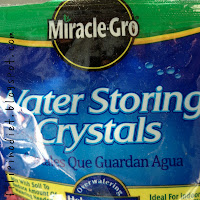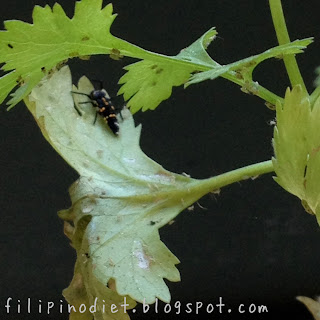"Healthy" in my books does not only mean "low-calorie". I think it also means getting away from extra preservatives ever present in convenience foods, and trying to prepare food that are more "natural" in nature (less processed). Don't get me wrong, my husband and I are not advocates of crazy fad diets... which I probably will blog about in the future. We do not advocate strict organic eating either (because we still need to learn more about it), nor are we crazy health food nuts. We are still learning our way. But one thing we already know for sure, is that we love food.
Healthy eating, for us, involves a lot of home cooking. This way, we know exactly what went into the dish, and how it was prepared. We are still in the infancy of learning what flavors go well with what. What we've already discovered though, is the extra flavor in food delivered by fresh herbs.
We've tried growing herb gardens before, but have failed. In Canada, our herbs would begin to grow, but then we would lose them because of it getting too hot too quickly, or spider mites or other bugs would begin to take hold.
But this summer, likely due to my less busy schedule of being in-between jobs, I was finally able to keep some herbs alive around the house! There were two secrets to this semi-success: (1) extra water retention, for those days I forget to water them, and (2) for the outdoor ones, beneficial insects.
So, we've successfully grown thyme and sage (photo), which we keep indoors (although by a west-facing window, so you can see how the plants are desperately trying to reach more light), and basil, chives, cilantro, and Italian parsley, which we keep outdoors.
Being in California, where it is so incredibly dry, not being strict about the watering regime proves to be a nightmare for keeping plants. And when I was working full time, that is how our herbs did not survive. Just kept forgetting about watering them. But now, although I still forget every now and then, I have added superabsorbents into the soil before sprinkling the seeds to grow (it's so much cheaper to sow seeds than to have to purchase the plant from a nursery). This is what I've used, and it worked wonders:
The other thing I've decided to face head on since moving to California, is to attempt to battle the bug infestations on these plants. And believe me, I have battled. It is almost a lesson in frustration at times... you win one, and another takes hold. Recently, my thriving cilantro patch was taken over by aphids. The plants were getting older, and beginning to bloom, so I wasn't too concerned; I just sowed more seeds elsewhere. These plants were infested - and it was frustrating to see the aphid population devour the plants that have given us so much flavor over the summer! So we were planning on purchasing some ladybugs from a local nursery to try to get rid of these bugs - they LOVE to eat aphids. But one day, I saw a lady bug on the cilantro, eating away. I hoped that others would follow. But the next day, it was gone. Decided then that we must really go and purchase some. The problem though, is that since it's still rather warm out, we were waiting for cooler evenings and days so that our bugs don't leave quickly, like the one rogue one I saw on the plants (ladybugs are not that cheap to buy). Today, as I watered them, I decided we have to get ladybugs this weekend because they have already migrated from the cilantro over to the parsley, and proliferating well. Sigh. Another battle. But then, I saw this black bug (note the thriving aphid population!):
I was hoping it ate aphids (although I was a little grossed out by its looks), and didn't think anything of it, until I saw a few more. So I googled this black bug, and found out that it is the larva of a lady bug! Yay! Yay for beneficial insects. Hopefully they're hungry!
So anyway, onward we trudge towards keeping our herb garden. It has really elevated the dishes we've been cooking this summer! I fully recommend planting one, even a small one - with just your favorite herbs. So much satisfaction - not only from seeing the fruits of your labor, but also in the remarkable flavor you get in your food.



Update: Yesterday, I checked how my ladybug larvae were doing, and they seem to have disappeared! Although I saw two or three live aphids, the rest of them were merely carcasses... I guess the ladybugs have decided to move on to other plants in search of more food! :)
ReplyDelete